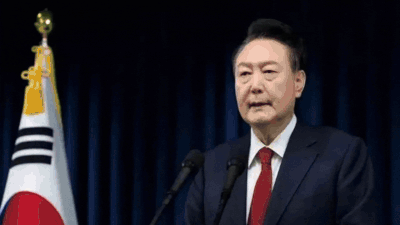South Korean investigators on Friday failed to arrest president Yoon Suk Yeol after a six-hour-long standoff with the presidential security service, following his failed bid to impose martial law.
South Korea’s anti-corruption agency withdrew its investigators after they were blocked from entering Yoon’s official residence in central Seoul.
“Serious regret about the attitude of the suspect, who did not respond to a process by law,” the probing agency said
The arrest warrant against Yoon is valid for one week. Officials said that the agency will discuss further actions, but did not immediately say whether it would make another attempt to detain Yoon.
Meanwhile, thousands of Yoon’s supporters gathered outside his residence waving the national flag and chanted “Let’s protect Yoon Suk Yeol!” as they called the parliamentary impeachment “null and void.”

According to a report in the New York Times, Cha Myong-in, a former conservative lawmaker, urged Yoon supporters to form “a human chain” to deny officials access to the presidential residence. Dozens of supporters lay on the pavement, with their arms locked, across the alley leading to Yoon’s residence. Police removed them, with some protesters dragged away.
“The president is like the king and how can you treat your king like this?” said Lee Young-jin, 65, referring to the court warrant that empowered officials to detain Yoon. “The presidential guard should throw grenades if necessary to stop them from coming near the president.”
Yoon’s legal team filed an injunction to block the warrant and submitted an objection to the court that issued it. The CIO head warned that obstructing the arrest could lead to prosecution. Previous attempts to arrest lawmakers in 2000 and 2004 failed due to similar resistance.
Yoon’s lawyer, Yoon Kap-keun, opposed the warrant. “The execution of a warrant that is illegal and invalid is indeed not lawful,” he stated. The President has remained at his residence since the court approved the warrant earlier this week, vowing to ‘fight’ authorities.
President Yoon declares, then quickly rescinds martial law
Yoon Suk Yeol declared martial law on December 3, then quickly reversed it after widespread opposition. Yeon cited “anti-state activities” and threats from North Korea as justification for the move, which would have given the military control over civilian functions.
In a televised address, Yoon explained that martial law was necessary to protect the country from “anti-state forces” and the growing threat posed by North Korea. The president accused opposition parties of paralyzing the government and undermining the country’s democracy, although he provided little concrete evidence for these claims.
Martial law’s restrictions
Public gatherings, strikes, and media control The martial law declaration imposed severe restrictions, including a ban on public gatherings, strikes, and political activity.
It also placed media outlets and healthcare workers under military control, forcing medical staff to return to work within 48 hours. These measures were seen as a drastic attempt to curb dissent and enforce government control
If arrested, Yoon would be the first sitting South Korean president detained. He faces potential imprisonment or even the death penalty. Yoon issued the martial law declaration on 3rd December, 2024 causing national unrest.




